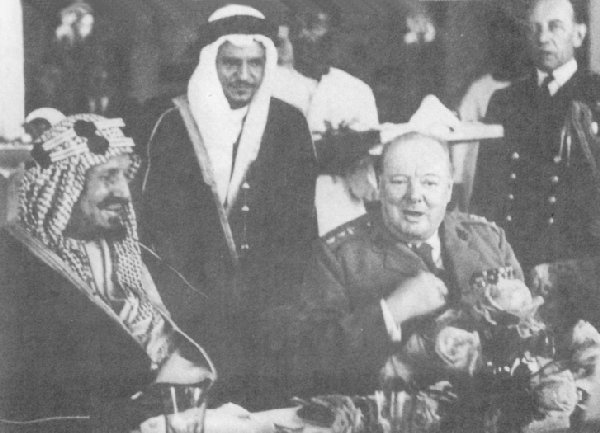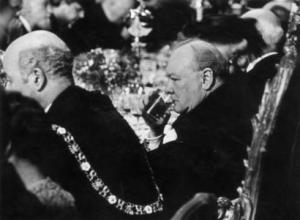
Winston Churchill refuses to eat at the royal banquet of Saudi Arabian king Ibn Saud since no alcohol is served.
In the Western World he is mainly considered a hero. Sir Winston Churchill (1874-1965) was in fact the war politician that gave the United Kingdom it’s leading role opposing Nazi Germany in World War II. Together with the American president Franklin Roosevelt and the leader of the Soviet-Union Jozef Stalin he sat on the winners table at the end of the war. Besides that he also won a Nobel price for literature. But the biography of Churchill is not one big success story. In World War I as the British First Lord of Admiralty he was behind the disastrous Gallipoli Campaign. Also his second term as British prime minister is seen as a failure since he desperately tried to keep the British empire intact, often using brutal military force in the colonized lands. It gave him the image of a politician that is at his best when the country is at war but not cut out for times of peace. However we like to remember him in the first place as a great drinker.
In our post about Stalin we already told you how Churchill won the respect of the Soviet leader in a night of heavy drinking. But there are plenty of other anecdotes to be told. The English prime minister would always start the day with a drink his daughter would call the “Daddy Cocktail”, a drink that contained Johnny Walker and water. A habbit he picked up as a young man while serving in India, where the water simply wasn’t drinkable without alcohol. And on another exotic trip in 1899 as Churchill was covering the Second Boer War as a correspondent for the Morning Post he went to the frontline with 36 bottles of wine, 18 bottles of scotch and 6 bottles of brandy. This story gave the then 25 year old Churchill the reputation of a heavy drinker. During World War I he chose the frontline over the cosy headquarters which in 1915 was considered very brave. Until a close friend of Churchill explained: “Hard liquor was prohibited at battalion headquarters. And only sweet tea provided, a beverage by no means to Winston’s taste.”
At a later age most of his alcohol consumption happened during meals. Or as he once explained to king Ibn Saud of Saudi Arabia, who served no alcohol for religious reasons, that he could not eat from the royal banquet since his rule in life was to drink before, during and after each meal. Still some historians claim Churchill was saying stuff like that more to show off and that his actual alcohol intake wasn’t that much. They also place question marks by his state of intoxication during the famous incident when Lady Astor accused the prime minister of being drunk. A remark on which Churchill replied with one of his famous come backs: “Yes, I am drunk today madam. But tomorrow I shall be sober, but you will still be ugly.” A possible explanation is that Churchill believed Europeans respected leaders that could hold their liquor and therefor was quite fund of his reputation as a heavy drinker.
Despite what these historians say there are also plenty of sources that claim Churchill was indeed a big drinker. It has even been suggested that his heavy drinking caused him to give up his position as prime minister. A certain Lord Moran said about Churchills drinking habbits: “It makes his speech more difficult to understand and fuddles what is left of his wits. And yet he does not attempt to control his thirst.” Or as biographer William Manchester described the last years of the former political leader of the United Kingdom: “There is always some alcohol in his bloodstream. And it reaches its peak late in the evening after he has had two or three scotches, several glasses of champagne, at least two brandies and a highball.”
In the 90 years of his life the total alcohol intake of Churchill must have been impressive. Still he lived to see this respectable age and one can’t say he had a boring life. He survived the frontlines of Cuba, India, Sudan and South Africa, played key roles in both world wars, served two terms as the prime minister of the U.K. and won a Nobel price for literature. All of that under his motto “I have taken more out of alcohol than alcohol has taken out of me.” Can’t argue with that.
Micky Bumbar

Love it, great read.
LikeLike
Thanks a lot.
Cheers,
Micky
LikeLike
Well, you’d need a stiff drink if you were having a ruck with Hitler.
LikeLiked by 1 person
Well in my humble opinion that’s what caused Hitler’s loss… a 2 front war against 2 major drinkers and he himself was very moderate with alcohol. What was he thinking? 😉
LikeLike
Clearly a fool! Never underestimate the ability of a chap (or chapess) who can handle their booze!
LikeLiked by 1 person
Indeed…. A drunk person sees double, so you better believe he is prepared to take on an army twice the size of yours! 😀
LikeLike
Excellent logic, my friend, excellent logic. I salute you! 😀
LikeLiked by 1 person
Right back at you… Cheers!
LikeLiked by 1 person
Cheers!
LikeLiked by 1 person
He was a psychopath with narcissism? Or..his brain was eaten by syphylis.. moreover, he knew he could get away with genocide and inevitable Germany destruction because they were suffering in a Great Depression that was more paralyzing that the US ever felt in the 1930s. Propaganda, poverty, and desperation caused this man.
LikeLike
Pingback: How alcohol played a key role in warfare around the world | Lords of the Drinks
Pingback: Jozef Stalin, paranoid dictator, mass murderer but a great drinker | Lords of the Drinks
Pingback:
Pingback: How New Zealand was saved from prohibition by its soldiers after World War I | Lords of the Drinks
Pingback:
Churchill did not “give up” his position as Prime Minister after WWII. He lost an election to a smart opponent who got more votes than Churchill.
And Churchill didn’t lose that election because of his love for alcohol. Churchill always loved alcohol. But he was a tireless campaigner, anyway. In 1945 Clement Atlee beat Churchill fair and square in a democratic election. Churchill kept on politicking and drinking, and was British Prime Minister again 5 years later.
LikeLike